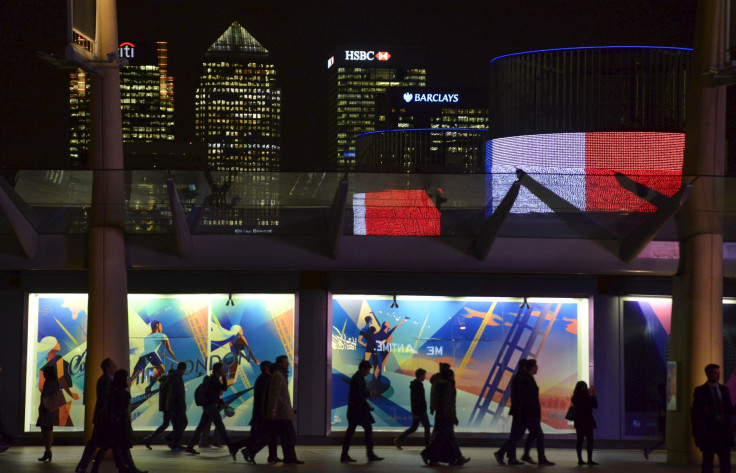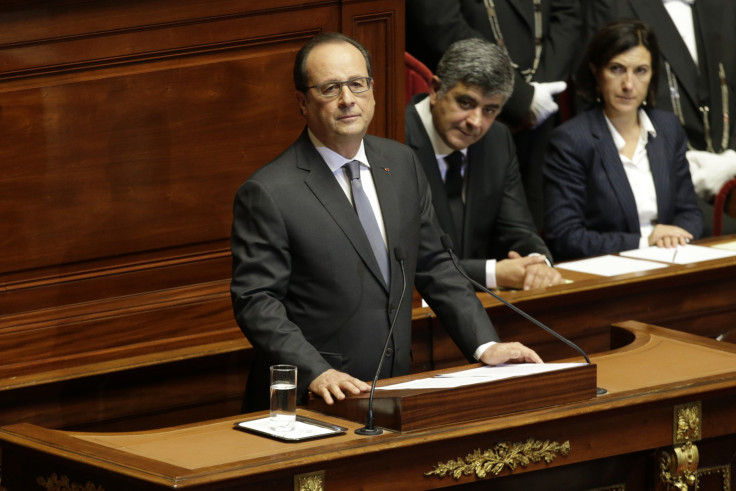France Civil Liberties: After Paris Terror Attacks, Will New Security Measures Divide Or Conquer?

As French President François Hollande pledged Monday to pursue broader, more hard-line security measures following Friday's coordinated terror attacks in Paris, observers watched warily to see what new policies might unfold. As the fragile balance between national security and civil liberties once again rose to the forefront of an ongoing international debate, human rights advocates pointed to a host of laws already on the books in places from the U.K. to Australia to Tajikistan that they say threaten to infringe on human rights and exacerbate, not prevent, violent extremism.
"France is at war against jihadi terrorism," Hollande said in an address to the French Parliament, adding that France should be able to revoke citizenship of convicted terrorists who are naturalized and have dual citizenship.
The new era of global counterterrorism that emerged in the wake of the Sept. 11, 2001, attacks in the U.S. is continuing to embroil civil liberties advocates in a host of political and legal battles. Vast data collection and surveillance, the extent of which was unveiled in 2013 by former National Security Agency contractor Edward Snowden, has already prompted fierce backlash and national policy debates across the U.S., with a federal court ruling its phone records program was illegal. The American Civil Liberties Union also waged and won a legal fight against the U.S. government’s policy of including some 47,000 people on a no-fly list without notification or rationale.
But in recent years, particularly with the rise of so-called foreign fighter attacks, in which people travel abroad and get radicalized in foreign wars before launching assaults back home, there have been several new security laws and policies adopted in countries around the world that have triggered fresh concern from human rights advocates.
The United Nations Security Council approved a binding resolution in September 2014 calling on member states to enact legislation aimed at stemming the flow of foreign fighters across their borders. But in the year since the resolution came into force, “states have been passing overbroad laws that in the end made it contributing to further radicalization because of their repressive nature,” said Akshaya Kumar, deputy U.N. director at advocacy organization Human Rights Watch, based in New York City.
Human Rights Watch discovered around 35 countries that had laws considered to be overreaching in their pursuit of security, opening up a host of opportunities for governments to infringe on civil rights, Kumar said.

In Tajikistan, for example, the government issued a decree that citizens under the age of 35 would be prohibited from traveling to Saudi Arabia's holy Mecca and Medina sites for the annual hajj religious pilgrimage for Muslims. In Malaysia, lawmakers have approved extrajudicial detentions for those found to be engaging in acts related to foreign terrorist organizations.
Germany in 2014 authorized officials to issue replacement identification cards for those prohibited from traveling due to security concerns. The replacement ID cards have prompted concerns that they could further stigmatize those who hold them.
These laws only contribute to further marginalization of communities that are already at risk of radicalization from being disenfranchised, Kumar said. “What the international community has recognized more broadly is that prevention and efforts to combat violent extremism have to be grounded in community engagement,” she said. “One of the concerns communities at risk consistently express is fear that they’re being profiled, that they’re feeling targeted, that they don’t feel safe in their schools or places of religious worship because of issues in surveillance.”
Canada and Australia have also issued recent, controversial measures that prohibit nationals from advocating for acts of terrorism, which has rankled free speech advocates in both nations.
“It’s understandable why societies might want to focus on extremist speech, especially speech that apologizes or tries to justify such horrific violence,” said Kent Roach, a professor of law at the University of Toronto who has specialized in Canada's anti-terror policies. “But there’s arguments that it may also be counterproductive if it creates the idea that the West is opposed to ideas and grievances, as opposed to violence.” That could further widen the gap between perceptions of the West and Islam, he said.
What comes next for #ParisAttacks ? I'm worried about #civilliberties if individual surveillance becomes security focus #paris
— Janine di Giovanni (@janinedigi) November 16, 2015
A series of recent laws in Britain have especially alarmed civil rights advocates. Under a measure passed last year, officials can revoke citizenship of those convicted of terrorist acts, even if it makes them stateless in the process. Earlier this month, Britain's home secretary also unveiled a proposal to grant new surveillance powers to state security officials, allowing them to get a hold of records monitoring citizens’ Internet use without requiring judicial permission.
Such measures in the U.K. are “akin to the kind of thing that the NSA was doing in the U.S. that was found to be a violation of law, mass surveillance,” said Gabor Rona, a professor of law at Benjamin Cardozo School of Law at Yeshiva University in New York City who specializes in international human rights law. “These kinds of activities I think merely tend to marginalize vulnerable communities and people and drive them away from assimilation into society at large. And that’s a grave risk.”
One major problem that has encouraged overly broad laws is the fact that there is still no international legal definition of “terrorism,” Rona said. That leaves countries to define it for themselves, and has allowed some governments to apply those laws selectively. “Because there’s no international definition of terrorism, you see authoritarian repressive governments using that to label any legitimate political activity as terrorism,” he said. He pointed to China as an example: Beijing had been using anti-terror policies to crack down on ethnic Uighur Muslim separatists in the west.
It’s still unclear what new security measures France might impose to respond to the new threats it’s facing within its borders. But those who have already been watching new laws unfold around the world over the past year are watching carefully.
“When the U.S. had its response to 9/11, we had some friendly reminders from the French government not to sacrifice our civil liberties and not to declare war against the world in response, that it was counterproductive and an overreaction,” Rona said. “I hope the French remember what they so rightly warned us of when it happened to us.”
© Copyright IBTimes 2025. All rights reserved.






















